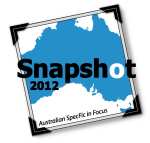 JANEEN Webb is a multiple award-winning author, editor and critic who has written or edited 10 books and more than a hundred essays and stories. She is a recipient of the World Fantasy Award, the Aurealis Award, the Peter MacNamara SF Lifetime Achievement Award, and is a three-time winner of the Ditmar Award. She is internationally recognised for her critical work in speculative fiction and has contributed to most of the standard reference texts in the field. She holds a PhD in Literature from the University of Newcastle, and lives on a small farm overlooking the sea near Wilson’s Promontory.
JANEEN Webb is a multiple award-winning author, editor and critic who has written or edited 10 books and more than a hundred essays and stories. She is a recipient of the World Fantasy Award, the Aurealis Award, the Peter MacNamara SF Lifetime Achievement Award, and is a three-time winner of the Ditmar Award. She is internationally recognised for her critical work in speculative fiction and has contributed to most of the standard reference texts in the field. She holds a PhD in Literature from the University of Newcastle, and lives on a small farm overlooking the sea near Wilson’s Promontory.
You’re cancer battle meant you weren’t able to co-edit 2008’s Dreaming Again (the follow-up to 1998’s milestone Dreaming Down Under) as planned, but you’ve since, wonderfully, announced that you’re back. How have you been making up for that lost time in your writing? Back to your Sinbad series, perhaps?
In all honesty, I should say that I still have, and probably always will have health issues – remission isn’t cure – and I just have to accept that. And although it sounds trite to say that writing is a great form of therapy, like so many axiomatic statements, it happens to be true: writing is a kind of zen space where the world can be as one would wish it to be, and I can try to make up for lost time. And I’m happy to say that yes, there is a third Sinbad YA novel in progress, working title Flying to Babylon. I am also writing an Arthurian fantasy, Perfect Knight, and an alternate Australian history novel.
Back in ’98 you co-wrote an academic study, Aliens & Savages, on racism/bias in Australian SF: have you been able to keep track to provide an idea of how the current situation compares?
I think this is one of those times when fiction is ahead of politics. We currently see a xenophobic political focus playing the politics of fear in a way that would not have been out of place in the 19th century. It seems our leaders have not yet learned kindness to strangers. Recently published fiction is more generous and understanding in its explorations of issues concerning both indigenous and immigrant peoples: it was good to see Kim Scott win the Miles Franklin Award with his historical novel of culture clash, That Deadman Dance.
You’re known for your academic work in the realm of speculative fiction as well as your fiction. How do you find the two streams rest side by side — do they feed each other or are they slightly uncomfy bedfellows?
It took me a long time to learn that the research techniques for both academic work and fiction are the same thing, seen from different angles: that I can use the same skill base but apply the results in a different fashion. The best fiction has a solid research base underneath it, and a background in the academic world does no harm at all in honing those technical skills.
I recently used material from Aliens & Savages as the basis for my story ‘Manifest Destiny’ (in Gillian Polack’s Baggage anthology, reprinted in Liz Grzyb and Talie Helene’s 2010 Years Best Australian Fantasy & Horror from Ticonderoga), and am revisiting more of that work for my alternate history novel, so in that sense the two areas do complement each other very well.
The downside of being a critic is my constant awareness of the scope the field, of the best that is produced, of the sheer volume of work that’s out there: sometimes it’s hard to stifle that internal critical voice in order to write at all!
What Australian works have you loved lately?
My favourite new work is Kim Westwood‘s The Courier’s New Bicycle, which recently won the Aurealis Award for science fiction novel. Kim has thought deeply about the issues of gender and has some very original ideas embedded in a compelling story: she is a genuinely fascinating new voice in the field.
What have been some of the biggest changes in Australian speculative fiction in the past two years since Aussiecon 4?
I think it’s really too soon to tell: a lot of things are still in the pipeline.
One thing I will note is the rapid expansion of Creative Writing PhDs in the field. With so many of our best writers venturing into this sphere, SF has reached critical mass in this area. This unexpected incursion into academia will have an enormous impact in future years: I like the idea that SF is finally colonising the mainstream.
THIS interview was conducted as part of the 2012 Snapshot of Australian Speculative Fiction. We’re blogging interviews from 1-8 June and archiving them at Australian Speculative Fiction in Focus. You can read interviews at:


Pingback: Snapshots! Part Nineteen | Refracted Ambiguity with Polar Bear